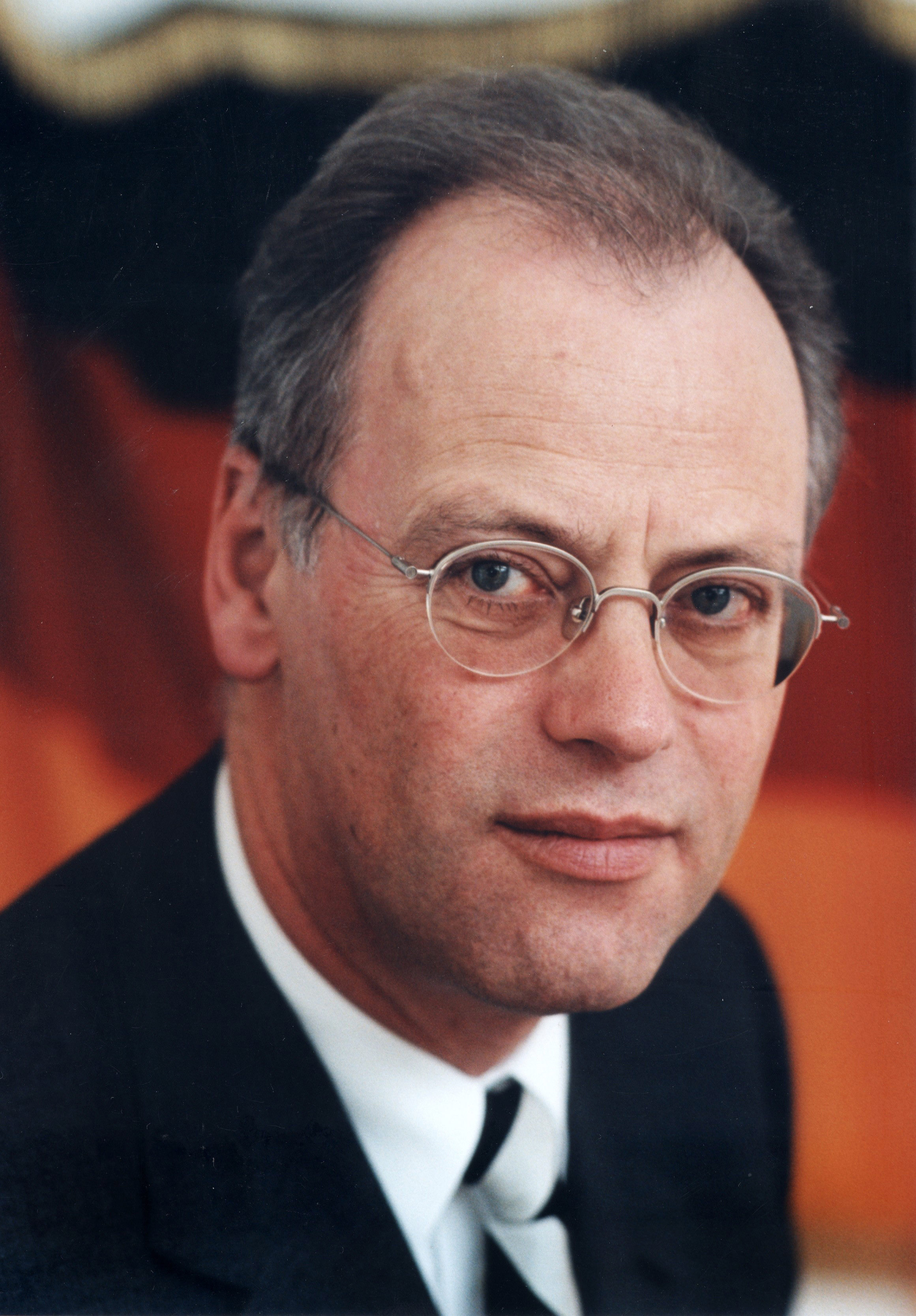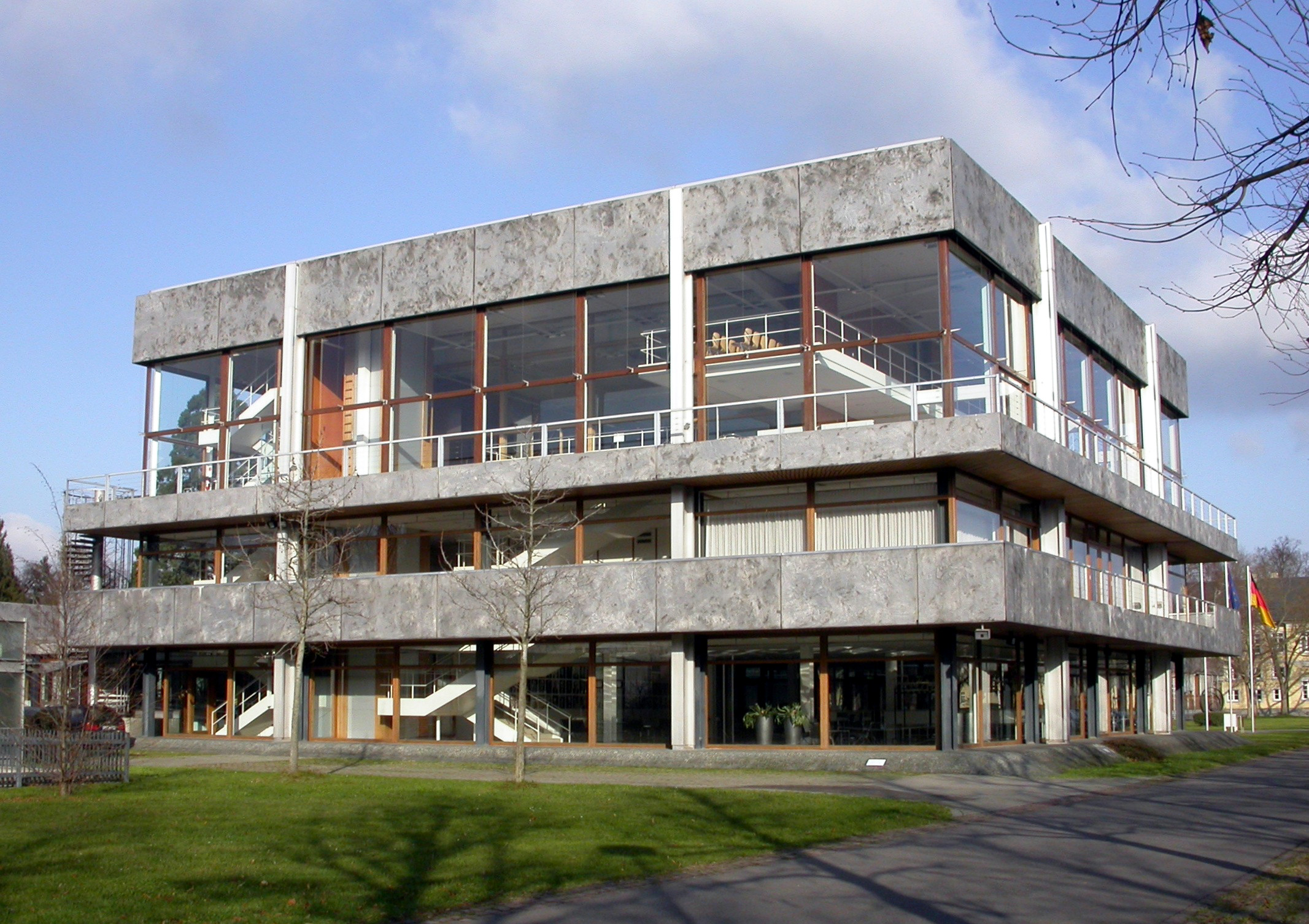|
Herta Däubler-Gmelin
Herta Däubler-Gmelin (; born 12 August 1943) is a German lawyer, academic and politician of the Social Democratic Party. She served as Federal Minister of Justice from 1998 to 2002, and as a Member of the Bundestag from 1972 to 2009. She currently teaches as an honorary professor of political science at the Free University of Berlin, particularly on international relations and human rights, and was the Hemmerle Professor at RWTH Aachen University in 2011. She is married to the legal scholar Wolfgang Däubler. History She was born in Bratislava, in the war-time Slovak Republic, as the daughter of Hans Gmelin (d. 1991), who was mayor of Tübingen from 1954 to 1974. She studied history, economy, law and political science in Tübingen and Berlin. Since 1974, she has been admitted as a lawyer, first in Stuttgart, then in Berlin. Since 1992, she has lectured law at the Freie Universität Berlin, which made her an honorary professor in 1995. Political career Däubler-Gmelin joined ... [...More Info...] [...Related Items...] OR: [Wikipedia] [Google] [Baidu] |
Federal Ministry Of Justice (Germany)
The Federal Ministry of Justice (german: Bundesministerium der Justiz, ), abbreviated BMJ, is a cabinet-level ministry of the Federal Republic of Germany. Under the German federal system, individual States are most responsible for the administration of justice and the application of penalties. The Federal Ministry of Justice devotes itself to creating and changing law in the classic core areas related to Constitutional law. The Ministry also analyzes the legality and constitutionality of laws prepared by other ministries. The German Federal Court of Justice, the German Patent and Trade Mark Office (GPTO), and the German Patent Court all fall under its scope. The ministry is officially located in Berlin. The BMJ was founded on January 1, 1877, as the Imperial Justice Office (''Reichsjustizamt''). After Germany became a republic in 1919, it was renamed ''Reichsministerium der Justiz'' (Imperial ministry of Justice). The ministry was refounded as the ''Bundesministerium der Justiz ... [...More Info...] [...Related Items...] OR: [Wikipedia] [Google] [Baidu] |
Berlin
Berlin is Capital of Germany, the capital and largest city of Germany, both by area and List of cities in Germany by population, by population. Its more than 3.85 million inhabitants make it the European Union's List of cities in the European Union by population within city limits, most populous city, as measured by population within city limits having gained this status after the United Kingdom's, and thus London's, Brexit, departure from the European Union. Simultaneously, the city is one of the states of Germany, and is the List of German states by area, third smallest state in the country in terms of area. Berlin is surrounded by the state of Brandenburg, and Brandenburg's capital Potsdam is nearby. The urban area of Berlin has a population of over 4.5 million and is therefore the most populous urban area in Germany. The Berlin/Brandenburg Metropolitan Region, Berlin-Brandenburg capital region has around 6.2 million inhabitants and is Germany's second-largest metropolitan reg ... [...More Info...] [...Related Items...] OR: [Wikipedia] [Google] [Baidu] |
German Civil Code
German(s) may refer to: * Germany (of or related to) **Germania (historical use) * Germans, citizens of Germany, people of German ancestry, or native speakers of the German language ** For citizens of Germany, see also German nationality law **Germanic peoples (Roman times) * German language **any of the Germanic languages * German cuisine, traditional foods of Germany People * German (given name) * German (surname) * Germán, a Spanish name Places * German (parish), Isle of Man * German, Albania, or Gërmej * German, Bulgaria * German, Iran * German, North Macedonia * German, New York, U.S. * Agios Germanos, Greece Other uses * German (mythology), a South Slavic mythological being * Germans (band), a Canadian rock band * "German" (song), a 2019 song by No Money Enterprise * ''The German'', a 2008 short film * "The Germans", an episode of ''Fawlty Towers'' * ''The German'', a nickname for Congolese rebel André Kisase Ngandu See also * Germanic (other) ... [...More Info...] [...Related Items...] OR: [Wikipedia] [Google] [Baidu] |
Same-sex Marriage In Germany
Same-sex marriage in Germany has been legal since 1 October 2017. A bill for the legalisation of same-sex marriage passed the Bundestag on 30 June 2017 and the Bundesrat of Germany, Bundesrat on 7 July. It was signed into law on 20 July by President of Germany, President Frank-Walter Steinmeier and published in the ''Bundesgesetzblatt (Germany), Federal Law Gazette'' on 28 July 2017. Previously, the governing CDU/CSU had refused to legislate on the issue of same-sex marriage. In June 2017, Chancellor Angela Merkel unexpectedly said she hoped the matter would be put to a conscience vote in the Bundestag in the near future. Party leaders organised for a vote to be held in the last week of June during the final legislative session before summer recess. The Bundestag passed the legislation on 30 June by 393 votes to 226, and it went into force on 1 October. Germany was the first country in Central Europe to legalise same-sex marriage, the 15th in Europe overall, and the 23rd worldwide ... [...More Info...] [...Related Items...] OR: [Wikipedia] [Google] [Baidu] |
New York Times
''The New York Times'' (''the Times'', ''NYT'', or the Gray Lady) is a daily newspaper based in New York City with a worldwide readership reported in 2020 to comprise a declining 840,000 paid print subscribers, and a growing 6 million paid digital subscribers. It also is a producer of popular podcasts such as '' The Daily''. Founded in 1851 by Henry Jarvis Raymond and George Jones, it was initially published by Raymond, Jones & Company. The ''Times'' has won 132 Pulitzer Prizes, the most of any newspaper, and has long been regarded as a national "newspaper of record". For print it is ranked 18th in the world by circulation and 3rd in the U.S. The paper is owned by the New York Times Company, which is publicly traded. It has been governed by the Sulzberger family since 1896, through a dual-class share structure after its shares became publicly traded. A. G. Sulzberger, the paper's publisher and the company's chairman, is the fifth generation of the family to head the p ... [...More Info...] [...Related Items...] OR: [Wikipedia] [Google] [Baidu] |
Helmut Kohl
Helmut Josef Michael Kohl (; 3 April 1930 – 16 June 2017) was a German politician who served as Chancellor of Germany from 1982 to 1998 and Leader of the Christian Democratic Union (CDU) from 1973 to 1998. Kohl's 16-year tenure is the longest of any German chancellor since Otto von Bismarck, and oversaw the end of the Cold War, the German reunification and the creation of the European Union (EU). Further, Kohl's 16 years and 30 day tenure is the longest for any democratically elected Chancellor of Germany. Born in 1930 in Ludwigshafen to a Catholic family, Kohl joined the CDU in 1946 at the age of 16. He earned a PhD in history at Heidelberg University in 1958, and worked as a business executive before becoming a full-time politician. He was elected as the youngest member of the Parliament of Rhineland-Palatinate in 1959 and from 1969 to 1976 was minister president of the Rhineland-Palatinate state. Viewed during the 1960s and the early 1970s as a progressive within the C ... [...More Info...] [...Related Items...] OR: [Wikipedia] [Google] [Baidu] |
Rudolf Scharping
Rudolf Albert Scharping (born 2 December 1947) is a German lawyer and politician of the Social Democratic Party of Germany, Social Democratic Party (SPD). He was from 1991 to 1994 the 6th Minister President of the State of Rhineland-Palatinate and from 1998 to 2002 Federal Minister of Defence in the First Schröder cabinet, government of Chancellor of Germany, Chancellor Gerhard Schröder. From 1993 to 1995, Scharping was also the national chairman of the SPD. In the Bundestag election in 1994, he was candidate for chancellor. From March 1995 to May 2001, he served as chairman of the Party of European Socialists (PES). Early life and education Scharping was born in Niederelbert. He studied politics, sociology and law at the University of Bonn. His master's thesis was on Social Democratic campaign techniques in Rhineland-Palatinate. He speaks English. Political career Career in state politics Scharping joined the Social Democratic Party of Germany (SPD) in 1966. He was of th ... [...More Info...] [...Related Items...] OR: [Wikipedia] [Google] [Baidu] |
1994 German Federal Election
Federal elections were held in Germany on 16 October 1994 to elect the members of the 13th Bundestag. The CDU/CSU alliance led by Helmut Kohl remained the largest faction in parliament, with Kohl remaining Chancellor in a narrowly re-elected coalition with the Free Democratic Party (FDP). This elected Bundestag was the largest in history until 2017, numbering 672 members. Even though this election did not lead to a switch in government, it saw the election of many people to the Bundestag that would play an important role later. Future CDU leaders Friedrich Merz and Armin Laschet were first elected to the Bundestag in 1994, as were future cabinet ministers Norbert Röttgen and Peter Altmaier. This was the last election until 2009 that a center-right government was elected. Issues and campaign The Social Democratic Party (SPD) let its members elect a candidate for chancellor against Helmut Kohl after SPD leader Björn Engholm and chancellor candidate-designate had to resign in 199 ... [...More Info...] [...Related Items...] OR: [Wikipedia] [Google] [Baidu] |
Jutta Limbach
Jutta Limbach (27 March 1934 – 10 September 2016) was a German jurist and politician. She was a member of the Social Democratic Party of Germany (SPD) and served as President of the Federal Constitutional Court of Germany from 1994 to 2002, the first woman in this office. Early life and education Born as Jutta Ryneck, Limbach grew up in Berlin. Her grandmother Elfriede Ryneck was a member of the Weimar National Assembly and the Reichstag, and her father Ernst Ryneck served as mayor of Pankow after 1945. Limbach studied law in Berlin and Freiburg. She passed the first and the second state law examination in 1958 and 1962. From 1963 to 1966 she worked as a research assistant at the law school of the Free University of Berlin and received her doctorate in law in 1966, with a thesis in legal sociology.Participants Advisory ... [...More Info...] [...Related Items...] OR: [Wikipedia] [Google] [Baidu] |
Federal Constitutional Court Of Germany
The Federal Constitutional Court (german: link=no, Bundesverfassungsgericht ; abbreviated: ) is the supreme constitutional court for the Federal Republic of Germany, established by the constitution or Basic Law () of Germany. Since its inception with the beginning of the post-World War II republic, the court has been located in the city of Karlsruhe, which is also the seat of the Federal Court of Justice. The main task of the Federal Constitutional Court is judicial review, and it may declare legislation unconstitutional, thus rendering them ineffective. In this respect, it is similar to other supreme courts with judicial review powers, yet the court possesses a number of additional powers and is regarded as among the most interventionist and powerful national courts in the world. Unlike other supreme courts, the constitutional court is not an integral stage of the judicial or appeals process (aside from cases concerning constitutional or public international law), and does ... [...More Info...] [...Related Items...] OR: [Wikipedia] [Google] [Baidu] |
Working Group
A working group, or working party, is a group of experts working together to achieve specified goals. The groups are domain-specific and focus on discussion or activity around a specific subject area. The term can sometimes refer to an interdisciplinary collaboration of researchers working on new activities that would be difficult to sustain under traditional funding mechanisms (e.g., federal agencies). The lifespan of a working group can last anywhere between a few months and several years. Such groups have the tendency to develop a ''quasi-permanent existence'' when the assigned task is accomplished; hence the need to disband (or phase out) the working group when it has achieved its goal(s). A working group's performance is made up of the individual results of all its individual members. A team's performance is made up of both individual results and collective results. In large organisations, working groups are prevalent, and the focus is always on individual goals, performan ... [...More Info...] [...Related Items...] OR: [Wikipedia] [Google] [Baidu] |

.png)


.jpg)

